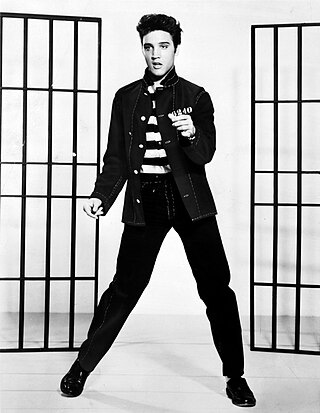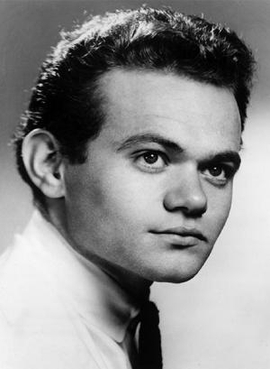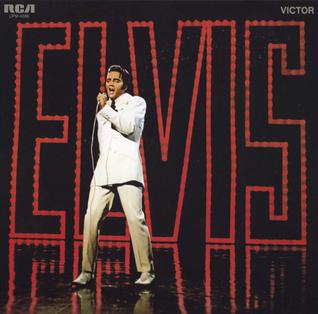Related Research Articles

Elvis Aaron Presley, known mononymously as Elvis, was an American singer and actor. Known as the "King of Rock and Roll", he is regarded as one of the most significant cultural figures of the 20th century. Presley's energized performances and interpretations of songs, and sexually provocative performance style, combined with a singularly potent mix of influences across color lines during a transformative era in race relations, brought both great success and initial controversy.

The Ed Sullivan Show is an American television variety show that ran on CBS from June 20, 1948, to March 28, 1971, and was hosted by New York entertainment columnist Ed Sullivan. It was replaced in September 1971 by the CBS Sunday Night Movie.

Harry Belafonte was an American singer, actor, and civil rights activist who popularized calypso music with international audiences in the 1950s and 1960s. Belafonte's career breakthrough album Calypso (1956) was the first million-selling LP by a single artist.
The year 1968 in television involved some significant events. Below is a list of television-related events in 1968.

Petula Clark CBE is a British singer, actress, and songwriter. She started her professional career as a child performer and has had the longest career of any British entertainer, spanning more than 85 years.

Colonel Thomas Andrew Parker was a Dutch-American talent manager and concert promoter, best known as the manager of Elvis Presley.

Speedway is a 1968 American musical action film starring Elvis Presley as a racecar driver and Nancy Sinatra as his romantic interest.

Singer Presents ... Elvis, commonly referred to as the '68 Comeback Special, is an Elvis Presley concert special that aired on NBC on December 3, 1968. It marked Presley's return to live performance after a seven-year period during which he focused on his film appearances.

Aloha from Hawaii via Satellite is a concert starring Elvis Presley that took place at the Honolulu International Center and was broadcast live via satellite to audiences in Asia and Oceania on January 14, 1973. The show was presented with a delay in Europe. In the United States, to avoid a programming conflict with Super Bowl VII and Elvis on Tour which was playing in cinemas at the time, NBC opted to air a ninety-minute television special of the concert on April 4.

"If I Can Dream" is a song made famous by Elvis Presley, written by Walter Earl Brown of The Skylarks for the singer and notable for its similarities with Martin Luther King Jr.'s 1963 "I Have a Dream" speech. The song was published by Elvis Presley's music publishing company Gladys Music. It was recorded by Presley in June 1968, just two months after King's assassination, and also a short time after Robert Kennedy's assassination. The recording was first released to the public as the finale of Presley's '68 Comeback Special.
Charles Franklin Hodge, better known as Charlie Hodge, was an American singer, vocal coach and musician who was a confidant and best friend of Elvis Presley, and lived at Graceland.

Chris Bearde was a British-born comedy writer, producer and director best known for his work as a writer on Rowan & Martin's Laugh-In and for co-writing and producing television specials for Elvis Presley, Bob Hope, Sonny & Cher, Bill Cosby, Steve Martin, Jim Carrey, Andy Williams, The Jackson 5, The Osmonds, Dinah Shore, Diana Ross, and Lucille Ball. He also created the format for the original Gong Show and a number of network and pay-cable comedy series including That's My Mama and Sherman Oaks.

Elvis is a 2005 biographical CBS miniseries written by Patrick Sheane Duncan and directed by James Steven Sadwith. It chronicles the rise of American music icon Elvis Presley from his high school years to his international superstardom.
John Stanley Livingstone Harris was a Scottish composer, producer, arranger, conductor, and musical director. He lived in the United States from 1972 until his death.
Dwight Arlington Hemion Jr. was an American television director known mainly for music-themed television programs of the 1960s and 1970s. He held the record for the most Emmy nominations (47), and won 18 times, putting him at the top of his profession throughout the 1960s, 1970s, and well into the 1980s. He also won the Directors Guild of America's top TV award five times, six Ace awards and a Peabody award.

Anita Mann is an American choreographer, dancer and actress. Mann has been honored by the Academy of Television Arts and Sciences as one of America's top five contemporary choreographers. She is also the recipient of five Emmy Awards and accolades from every corner of the industry.

David Winters was an English-born American actor, dancer, choreographer, producer, distributor, director and screenwriter. At a young age, he acted in film and television projects such as Lux Video Theatre,Naked City; Mister Peepers,Rock, Rock, Rock, and Roogie's Bump. He received some attention in Broadway musicals for his roles in West Side Story (1957) and Gypsy (1959). In the film adaptation of West Side Story (1961) he was one of the few to be re-cast. It became the highest grossing motion picture of that year, and won 10 Academy Awards, including Best Picture.

Elvis is the soundtrack album for American rock and roll singer Elvis Presley's 1968 television special of the same title, released by RCA Records. It was recorded live at NBC Studios in Burbank, California, with additional studio work taking place at Western Recorders, in June 1968. The album peaked at No. 8 on the Billboard 200; along with the TV special, it revitalized Presley's career after years of diminishing commercial and critical success. It was certified Gold on July 22, 1969, and Platinum on July 15, 1999, by the RIAA.
Joseph Anthony Tunzi is an American author, publisher, and producer, based in Chicago, Illinois. He has been described as "a renowned author from Chicago" and "one of the foremost authorities on Elvis Presley," authoring, self-publishing, and producing over 60 titles about Presley, among others, for over three decades. Tunzi's other projects focus on topics including Frank Sinatra, The Beatles, Muhammad Ali, Martin Luther King Jr., the Assassination of John F. Kennedy, and the Vietnam War.
Robert S. Finkel was an American producer and director. Finkel has notable credits on the TV shows The Eddie Fisher Show, The Dinah Shore Chevy Show and The Andy Williams Show. Finkel also produced multiple broadcasts of the People's Choice Awards, the Oscars and the Emmy Awards. He also produced the televised comeback concert for singer Elvis Presley in 1968, the highest rated television show for the week of broadcast, and the highest rated television special of the year.
References
- ↑ "Error".
- ↑ "Steve Binder". The Interviews: An Oral History of Television . 22 October 2017. Retrieved June 17, 2023.
- ↑ "Steve Binder Chapter 1", Directors Guild of America. Retrieved 19 May 2020
- ↑ "The Caucus for Producers, Writers & Directors | Caucus Journal | Archives". archive.caucus.org.
- 1 2 3 "Elvis the comeback'". Record Collector, 357 (Christmas 2008), p.61
- ↑ "Elvis : 68 Comeback Special | Elvis' Movies". movies.elvispresley.com.au. Archived from the original on November 3, 2007.
- ↑ "AFI|Catalog". catalog.afi.com. Retrieved April 20, 2019.
- ↑ "Librarian of Congress Adds Home Movie, Silent Films and Hollywood Classics to Film Preservation List". Library of Congress, Washington, D.C. 20540 USA. Archived from the original on July 13, 2023. Retrieved 2023-07-13.
- ↑ Harry Belafonte with Petula Clark – On The Path Of Glory on YouTube
- ↑ "Tempest in TV Tube Is Sparked by Touch". Spokane Daily Chronicle. AP. 5 March 1968. Retrieved 25 July 2016.
- ↑ "Bellafonte Hollers; Chrysler Says Everything's All Right". The Dispatch. Lexington, North Carolina. UPI. 7 March 1968. Retrieved 25 July 2016.
- ↑ "Chrysler Rejects Charges Of Discrimination In Show". The Morning Record. Meriden–Wallingford, Connecticut. AP. 7 March 1968. Retrieved 25 July 2016.
- ↑ "Belafonte says apologies can't change heart, color". The Afro American. 16 March 1968. Retrieved 25 July 2016.
- ↑ "Belafonte Ire Brings Penalty: Chrysler Official Apologizes To Star". Toledo Blade. AP. 11 March 1968. Retrieved 25 July 2016.
- ↑ Lowry, Cynthia (5 April 1968). "Critic liked Miss Petula Clark's show". Gettysburg Times. AP. Retrieved 25 July 2016.
- ↑ "Harry Belafonte 'Speaking Freely' Transcript". First Amendment Center. Archived from the original on 2004-10-19. Retrieved 2006-05-21.
- ↑ See Kirchberg, Connie and Marc Hendrickx, Elvis Presley, Richard Nixon, and the American Dream (1999), p.78.
- ↑ See Roy, Samuel, ‘’Elvis: Prophet of Power’’ (1985), p.86.
- ↑ "AOL - News, Politics, Sports, Mail & Latest Headlines".